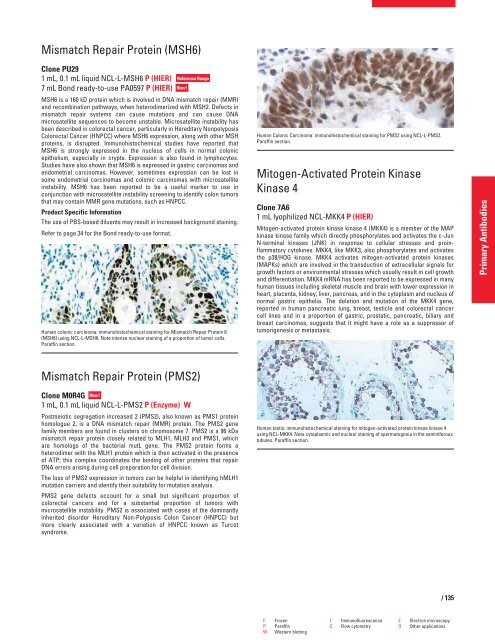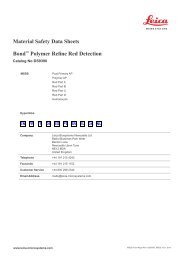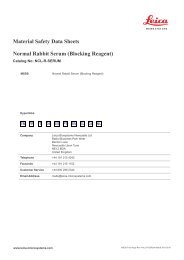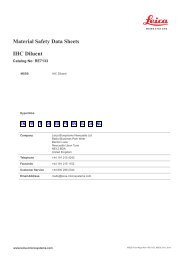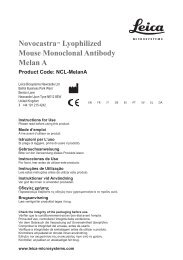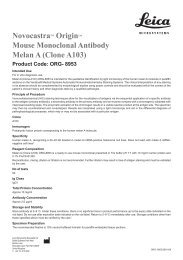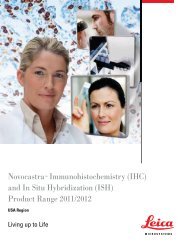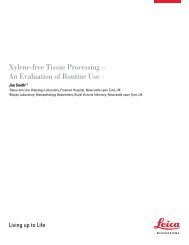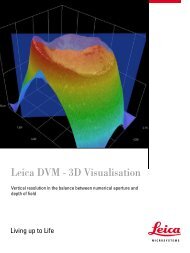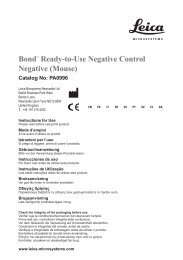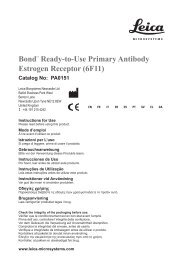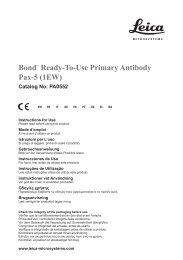Labelling Review row-Online
Labelling Review row-Online
Labelling Review row-Online
Create successful ePaper yourself
Turn your PDF publications into a flip-book with our unique Google optimized e-Paper software.
Mismatch Repair Protein (MSH6)<br />
Clone PU29<br />
1 mL, 0.1 mL liquid NCL-L-MSH6 P (HIER)<br />
7 mL Bond ready-to-use PA0597 P (HIER)<br />
MSH6 is a 160 kD protein which is involved in DNA mismatch repair (MMR)<br />
and recombination pathways, when heterodimerized with MSH2. Defects in<br />
mismatch repair systems can cause mutations and can cause DNA<br />
microsatellite sequences to become unstable. Microsatellite instability has<br />
been described in colorectal cancer, particularly in Hereditary Nonpolyposis<br />
Colorectal Cancer (HNPCC) where MSH6 expression, along with other MSH<br />
proteins, is disrupted. Immunohistochemical studies have reported that<br />
MSH6 is strongly expressed in the nucleus of cells in normal colonic<br />
epithelium, especially in crypts. Expression is also found in lymphocytes.<br />
Studies have also shown that MSH6 is expressed in gastric carcinomas and<br />
endometrial carcinomas. However, sometimes expression can be lost in<br />
some endometrial carcinomas and colonic carcinomas with microsatellite<br />
instability. MSH6 has been reported to be a useful marker to use in<br />
conjunction with microsatellite instability screening to identify colon tumors<br />
that may contain MMR gene mutations, such as HNPCC.<br />
Product Specific Information<br />
The use of PBS-based diluents may result in increased background staining.<br />
Refer to page 34 for the Bond ready-to-use format.<br />
Human colonic carcinoma: immunohistochemical staining for Mismatch Repair Protein 6<br />
(MSH6) using NCL-L-MSH6. Note intense nuclear staining of a proportion of tumor cells.<br />
Paraffin section.<br />
Mismatch Repair Protein (PMS2)<br />
Clone M0R4G New!<br />
1 mL, 0.1 mL liquid NCL-L-PMS2 P (Enzyme) W<br />
Reference Range<br />
New!<br />
Postmeiotic segregation increased 2 (PMS2), also known as PMS1 protein<br />
homologue 2, is a DNA mismatch repair (MMR) protein. The PMS2 gene<br />
family members are found in clusters on chromosome 7. PMS2 is a 96 kDa<br />
mismatch repair protein closely related to MLH1, MLH3 and PMS1, which<br />
are homologs of the bacterial mutL gene. The PMS2 protein forms a<br />
heterodimer with the MLH1 protein which is then activated in the presence<br />
of ATP; this complex coordinates the binding of other proteins that repair<br />
DNA errors arising during cell preparation for cell division.<br />
The loss of PMS2 expression in tumors can be helpful in identifying hMLH1<br />
mutation carriers and identify their suitability for mutation analysis.<br />
PMS2 gene defects account for a small but significant proportion of<br />
colorectal cancers and for a substantial proportion of tumors with<br />
microsatellite instability. PMS2 is associated with cases of the dominantly<br />
inherited disorder Hereditary Non-Polyposis Colon Cancer (HNPCC) but<br />
more clearly associated with a variation of HNPCC known as Turcot<br />
syndrome.<br />
Human Colonic Carcinoma: immunohistochemical staining for PMS2 using NCL-L-PMS2.<br />
Paraffin section.<br />
Mitogen-Activated Protein Kinase<br />
Kinase 4<br />
Clone 7A6<br />
1 mL lyophilized NCL-MKK4 P (HIER)<br />
Mitogen-activated protein kinase kinase 4 (MKK4) is a member of the MAP<br />
kinase kinase family which directly phosphorylates and activates the c-Jun<br />
N-terminal kinases (JNK) in response to cellular stresses and proinflammatory<br />
cytokines. MKK4, like MKK3, also phosphorylates and activates<br />
the p38/HOG kinase. MKK4 activates mitogen-activated protein kinases<br />
(MAPKs) which are involved in the transduction of extracellular signals for<br />
g<strong>row</strong>th factors or environmental stresses which usually result in cell g<strong>row</strong>th<br />
and differentiation. MKK4 mRNA has been reported to be expressed in many<br />
human tissues including skeletal muscle and brain with lower expression in<br />
heart, placenta, kidney, liver, pancreas, and in the cytoplasm and nucleus of<br />
normal gastric epithelia. The deletion and mutation of the MKK4 gene,<br />
reported in human pancreatic lung, breast, testicle and colorectal cancer<br />
cell lines and in a proportion of gastric, prostatic, pancreatic, biliary and<br />
breast carcinomas, suggests that it might have a role as a suppressor of<br />
tumorigenesis or metastasis.<br />
Human testis: immunohistochemical staining for mitogen-activated protein kinase kinase 4<br />
using NCL-MKK4. Note cytoplasmic and nuclear staining of spermatogonia in the seminiferous<br />
tubules. Paraffin section.<br />
F Frozen I Immunofluorescence E Electron microscopy<br />
P Paraffin C Flow cytometry O Other applications<br />
W Western blotting<br />
/ 135<br />
Primary Antibodies


